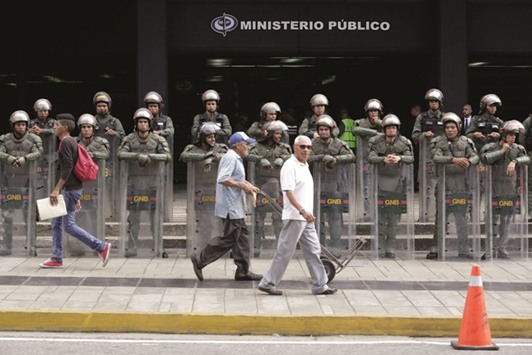Maduro’s centre-right rivals planned to push on with a three-week wave of street protests that have seen 26 people killed in clashes involving protesters and security forces.
In the latest unrest, public prosecutors said a 23-year-old man died from being shot in the head with a shotgun in overnight protests in northwestern Lara state.
The opposition blames Maduro for shortages of food, medicine and other essentials in the oil-rich country.
Maduro says the crisis stems from what he calls a US-backed capitalist conspiracy.
He has resisted more than a year of political efforts to vote him out of office, though he said at the weekend he was willing to hold regional elections.
With few options left to get rid of Maduro before the end of his term in late 2018, the opposition is urging all-out street rallies to push for elections.
“Let us not surrender. If we manage to keep up this pressure we will achieve change,” said senior opposition lawmaker Freddy Guevara.
“On Wednesday we will return to the streets” for a march in central Caracas to put pressure on state institutions loyal to Maduro, he said.
Falling prices for Venezuela’s crucial oil exports have slashed its revenues, leading to critical shortages and outbreaks of looting.
The courts and electoral authorities have fended off efforts to remove Maduro since an opposition majority took over the National Assembly in January 2016.
But moves by the Supreme Court to seize power from the assembly and ban senior opposition leader Henrique Capriles from politics galvanised the opposition and drew international condemnation.
“The opposition is more unified around the streets and seems to be reinvigorated, while the international community seems unlikely to back down,” said a US-based consultancy, Eurasia Group.
Maduro controls nearly all the state institutions and retains the support of the military.
“Key groups remain united around Maduro given high exit costs, which will enable him to remain in power. But that unity is more fragile in the past,” Eurasia Group said in a note on April 20.
“Mounting pressures from both the streets and the international community have the potential to widen — if not blow open entirely — existing fissures.”
Three people were killed on Monday in the latest day of nationwide protests.
Jorge Rodriguez, a senior pro-government politician, told state-run VTV late Monday that a young man was shot dead in the western city of Merida.
Prosecutors earlier announced the death of two men, aged 42 and 54, one in Merida and the other in the town of Barinas.
Government officials claimed two victims were government supporters.
Opposition leaders said the Barinas victim was in an anti-Maduro demo targeted by pro-government “paramilitaries.”
State ombudsman Tarek William Saab said that “gunshots rained” against a “peaceful concentration” of government supporters in Merida.
In Monday’s main march in Caracas, most demonstrators rallied peacefully but some masked protesters threw stones and clashed with police who fired tear gas and rubber bullets.
The opposition has accused Maduro of letting state forces and gangs of armed thugs violently repress demonstrators.
“These acts of resistance which force the dictator against the wall have very serious cost: deaths and prisoners,” Guevara said.
“They call themselves defenders of human rights but then they murder people. They’re the same as 2002,” Socialist Party No 2 Diosdado Cabello told a crowd, referring to a short-lived coup against Chavez that year.
The government has accused the opposition of fomenting unrest. How many more deaths will it take for the opposition extremists to abandon violence as a way of doing politics?” said the head of the army, Vladimir Padrino Lopez.

